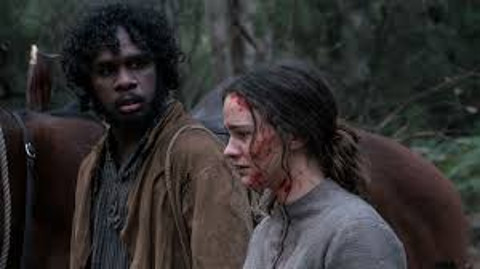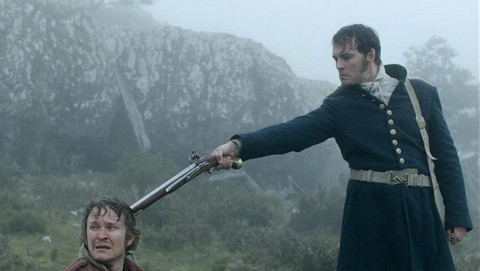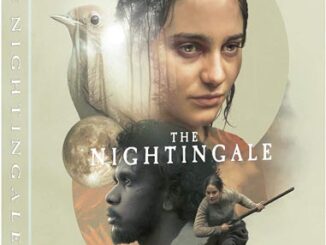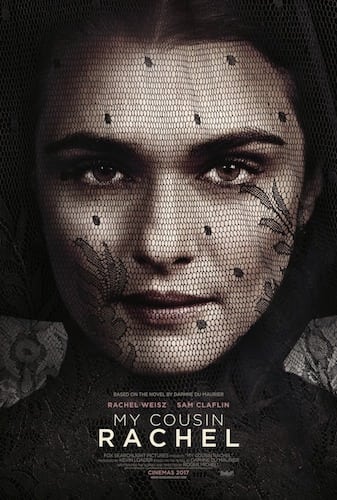The Nightingale (2018)
Directed by: Jennifer Kent
Written by: Jennifer Kent
Starring: Aisling Franciosi, Baykali Ganambarr, Harry Greenwood, Sam Claflin
AUSTRALIA
AVAILABLE ON DIGITAL, DVD and BLU-RAY
RUNNING TIME: 136 mins
REVIEWED BY: Dr Lenera
1820’s Tasmania, Australia, when the British ruled. 21-year-old Irish convict Clare completes her seven-year sentence as an indentured servant to Lieutenant Hawkins. During that time, she has married another Irish convict, Aidan, who won his freedom, and they now have a baby daughter. However, Hawkins refuses to grant her freedom; he considers her his property, and almost casually rapes her. Aidan’s intervention results in Hawkins and two of his men invading their house, resulting in two deaths and unimaginable shock for Clare. When British authorities fail to deliver justice, Clare pursues Hawkins, enlisting the help of an orphaned Aboriginal tracker Billy….
If you’re a regular reader of this website, you’ll no doubt have noticed that the productivity of reviews by Yours Truly has considerably lessened of late, but hopefully it will pick up soon, and I’ve had The Nightingale, a film that our David Smith listed in his top ten horror films of last year, in my pile of un-watched discs for some times so felt that I ought to finally give it a go; after all, it seemed like a film which I wouldn’t have trouble saying a lot about, and I do like the rape/revenge subgenre, despite it being rather a disreputable one until fairly recently. Of course it’s rather timely, seeing as we are currently existing in a time in which our colonial past is being questioned probably more than it ever has been before, and I do wonder if the film would have gotten far more attention if it came out around now. Writer/director Jennifer Kent tells us that her follow-up to her astonishingly frightening and uncomfortable horror The Badabook is “about the need for love, compassion and kindness in dark times”, and I can just about detect that, though quite often it gets so wrapped up in its carnage and cruelty that this idea seems all-but-forgotten. It tries to do even more than her first film; it might be another story of a female going through an intense psychological and physical experience, and be just as concerned with trauma and pain, but it also seems to a study of violence; how it’s catching, how it’s used, and how it affects both victims and perpetrators, and is set during one of Australia’s more inglorious conflicts in a history of inglorious conflicts: the Black War. Rather than being a full-scale war between armies, it was mostly a guerrilla war fought between British colonists and Aboriginal Australians, resulting in the near genocide of the native inhabitants of the area.
With all these ingredients, it would be mighty hard for Kent to make a bad film here, and by and large she succeeds in crafting a piece which is sobering, sometimes downright upsetting, and at times thought provoking, though it does have its problems, most notably with a few clumsy and even silly scenes and plot elements where Kent, seemingly having trouble moving her narrative onto the next stage, feels almost as lost as her characters are both externally and internally. There are a few odd decisions, such as filming it in tight 4.3 framing which is strange for a film that’s set predominantly outdoors. I soon realised that it was done to help bring a claustrophobic feel to the piece, and so that we keep our focus on the characters rather than being distracted by the landscapes, though said landscapes seem to become more of a feature later and one atmospheric scene set atop a foggy hill would be even more atmospheric if the picture had been wider. And what’s up with hearing their audio clipping every time a character talks loudly or yells? But I don’t want to sound too negative, because, as you should be able to tell from my star rating at the bottom of this review, there’s also a hell of a lot to praise, not least the incredible lead performance by Aisling Franciosi, a mainly TV actress who I hope has a long career in the movies. With the camera often fixated on her face in medium close-ups, she shows a great ability to show intense hurt, anger and confusion, often at the same time. The character is sometimes inconsistent in her actions and even it seems her thinking, but Franciosi keeps her convincing, and anyway if we’d gone through what she goes through I think that many of us would be the same.
The opening scene setting snapshots are rather jarring, not taking us into the film very easily, but then again there are soon times when it’s hardly easy to watch. Clare has been lucky enough to get herself a decent husband, a house [well, it’s more of a hut] and a baby, but she’s also house servant to Lieutenant Hawkins who also gets her, under the nickname “Nightingale”, to sing for both his men and himself, and he won’t release her. Instead, he strikes her, then ‘takes’ what he believes is his, the unpleasant nature of the scene being enhanced by the focus on her face, making us feel the moment horrifyingly. I wonder if this happens often? Even though Hawkins says it does, it’s left ambiguous. Clare returns home with bruises on her face and neck, and the next day Aidan goes to ask Hawkins to release her, something which he refuses to do. That evening, Hawkins is playing host to a visiting officer and his men, and a drunken Aidan returns, causing Hawkins to be denied the promotion he sorely wants. Furious, he and two of his men – Ruse and Jago – pay a visit to the Carroll household, resulting a truly nasty scene which got walk outs in Australia. While we’ve all seen more graphic scenes of a similar nature, the intensity achieved is quite something and its effect is only ruined by its strange conclusion where Clare is left alive despite her death being Hawkins’s mission. If these soldiers are ready to rape her in front of her husband, kill him and then kill her baby to stop it crying, it’s clear that they wouldn’t have hesitated to kill her as well. However, all that happens instead is that one of them knocks her out with the butt of his rifle. Well, I guess the story couldn’t have progressed otherwise, could it?
After Clare reports the incident to a dubious police official the following morning and a friend won’t help her, she decides to seek revenge herself, and try to catch up with Hawkins, Ruse and Jago, who are using an elderly Aboriginal tracker and three convicts [“a skeleton, a simpleton and a midget”] to help get them and their gear to their destination. No sitting around, no mourning for Clare -she even asks her friend to bury her family. Eventually a young Aboriginal tracker named Billy helps her, and the relationship of the two is presented believably; it takes a long time for the institutionally racist Clare to stop being domineering to Billy – real name Mangana which translates as “black bird” linking him even more with this former “nightingale” – even when he reveals that he has a tragic past possibly even more horrible than hers. But some slip-ups begin in earnest, such a horse which seems to appear and disappear at will whenever the terrain looks very hard for a horse to cross, peaking in a funny scene where Clare and Mangana lose pursuers in a shrubbery even though there’s this great big animal that they have to hide. Geography becomes confused, and some may feel that we’ve had enough rape already when more comes along, though seeing as native women were routinely used as sex slaves in reality, I personally don’t see this being gratuitous myself.
As things go on, the pace lessens as Kent tries to move away from the relatively narrow focus of a rape/revenge thriller, alighting more on things like the effect of war; heartbreaking scenes of outwardly alive people who are dead inside, a white woman holding a baby while looking at her burning house, the old aboriginal tracker having to watch witness horrific violence against one of his own and then keep guiding the perpetrators, a young convict boy named Eddie who sees two others killed right in front of him – tellingly one by an Aboriginal and another by an officer. Eddie’s subplot is very disturbing as the small child begins to be ‘trained’ in becoming a ‘man’ by Hawkins. I detect less the tiresome current movie trend for depicting ‘toxic masculinity’, and more the simple idea that dehumanisation can begin very early on, that brutality begats brutality. Clare is given a few feminist-esque lines which didn’t always strike me as being things that she would say, and, while the script being largely on the side of the Aboriginals is the right decision, Mangana, despite being excellently played by Baykali Ganambarr, is lazily depicted as being virtually perfect, something especially jarring seeing as, elsewhere, nobody is totally left off the hook, and seeing that Clare has a lot of [understandable] faults and is often making mistakes. In fact characters tend not to have any depth generally, and it’s usually up to the performers to add some nuance, something they usually succeed in doing. Sam Claflin is surprisingly effective stepping out of his comfort zone despite Hawkins being a very conventional baddie.
Some surprises in the narrative may disappoint those used to typical rape/revenge tropes, and the final scene is odd; it gives as a beautiful shot which will remain in the mind, but also seems to hint at some hope which I’m not sure the rest of the film supports. Likewise, the sheer amount of graphic violence, like a prolonged but probably very realistic stabbing where it takes the victim ages to die as he cries “mother help me”, has probably caused some critics and viewers to wonder if Kent’s commentary on violence is weakened by her seemingly indulging in it. When does a film about violence become just a violent film? It’s a difficult question, especially if you yourself are drawn to these types of movies and might even be desensitised. But on the other hand I wouldn’t personally say that the brutality in The Nightingale is ‘fun’ to watch, so I’d defend Kent’s approach. Muted colours and the total lack of a music score add to the power of her film, while some dream sequences recall the feel of her debut feature. I don’t think that, in the end, she succeeded in making the rather profound exercise that she seems to be straining for, but her film still possesses some gut-wrenching power in addition to being a necessary history lesson.
Rating: 

















Be the first to comment